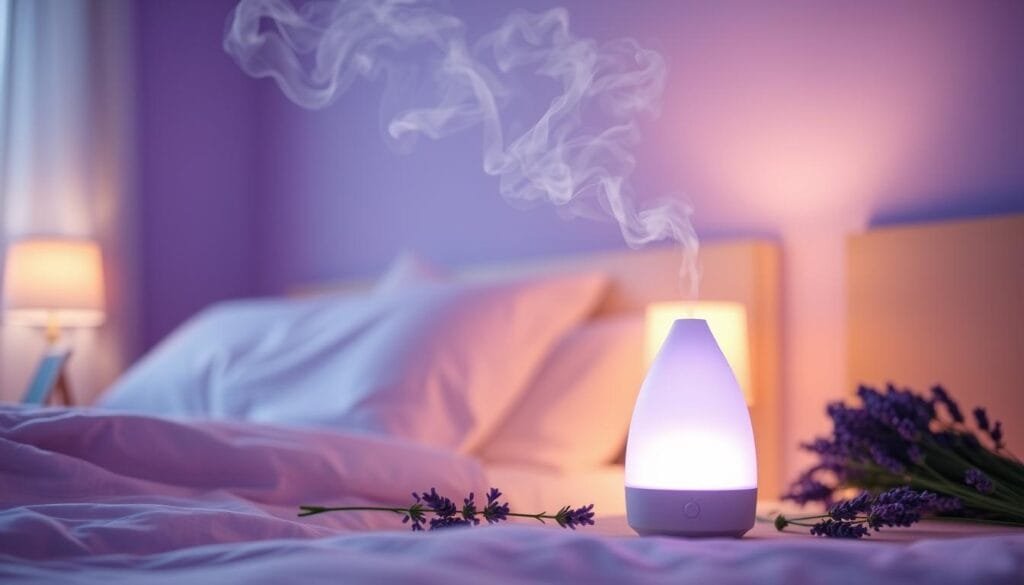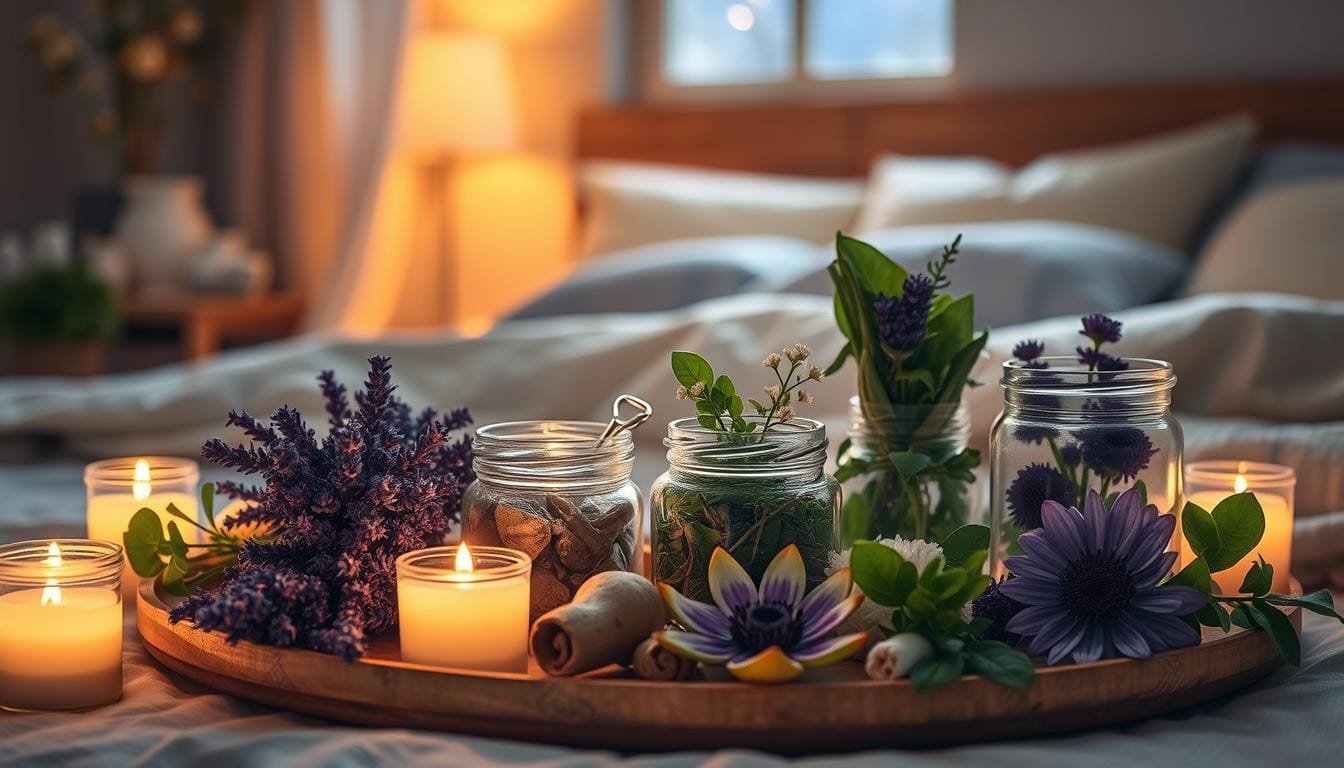Struggling with sleep can be tough. Finding natural ways to improve sleep is key. Botanical medicine has been around for centuries, used by many cultures. It’s interesting to note that 80% of the world’s population uses herbal medicines.
In this guide, we’ll look at natural herbs for sleep. You’ll learn about chamomile, valerian root, lemon balm, and passionflower. These herbs can help reduce anxiety and improve sleep quality.
Whether you have occasional insomnia or want better sleep, these natural remedies can help. Adding them to your bedtime routine might just give you the restful sleep you’ve been missing.
Understanding Sleep Challenges and Natural Solutions
Sleep disorders affect millions worldwide. They include trouble falling asleep, staying asleep, and waking up too early. These issues can harm our health and well-being. Luckily, natural sleep remedies offer benefits with fewer side effects than drugs.
Common Sleep Issues and Their Impact
Insomnia is the most common sleep disorder. It can cause daytime fatigue, lower productivity, and increase accident risks. Sleep apnea, with interrupted breathing, is linked to heart disease and stroke. Disrupted sleep can also lead to depression, obesity, and other health problems.
Why Choose Natural Sleep Remedies
Many are choosing natural sleep aids for a holistic approach. These herbal and botanical supplements have fewer side effects than prescription drugs. They are a gentle option for those seeking a natural solution.
The Science Behind Herbal Sleep Aids
Herbal sleep aids work in different ways to help sleep. Melatonin interacts with the body’s natural sleep cycle. Valerian and chamomile increase GABA, a neurotransmitter that relaxes. Research shows these natural remedies can improve sleep quality and duration.
| Natural Sleep Aid | Potential Benefits | Potential Side Effects |
|---|---|---|
| Melatonin | Decreases time to fall asleep, increases sleepiness | Grogginess, depression (with long-term use) |
| Valerian | Reduces time to fall asleep, improves sleep quality | Headaches, “hangover” feeling |
| Chamomile | Calming effects, may promote sleep | Limited evidence for effectiveness in treating insomnia |
It’s wise to talk to a healthcare professional before using natural sleep aids. This is true if you have health conditions or take other medications.
“Warm milk, chamomile tea, and tart cherry juice are recommended by Dr. Gamaldo for patients with sleep trouble.”
Valerian Root: The Most Popular Natural Sleep Aid
Valerian is a tall, flowering grassland plant. It has been studied a lot for its sleep benefits. Known for its calming effects, valerian root is a top natural sleep remedy.
How Valerian Root Works in Your Body
Valerian increases gamma-Aminobutyric acid (GABA) in the brain. GABA helps us relax and sleep. So, valerian makes us calm and helps us sleep better.
Recommended Dosage and Timing
- The typical dosage of valerian root extract is 400-900 mg. Take it 2 hours before bed.
- Valerian’s effects can vary. It might take up to 2 weeks to see its full benefits.
Potential Side Effects and Precautions
Valerian root is usually safe but can cause mild side effects. These include headaches, dizziness, and stomach issues. It’s not good for pregnant or breastfeeding women, kids under 3, or those with liver disease. It can also interact with some medicines, so talk to a doctor before using it.

Valerian root is a safe, gentle way to improve sleep. But, if you have ongoing insomnia, it might mean there’s a bigger issue. Always talk to a doctor to figure out what’s going on.
Chamomile: A Time-Tested Sleep Solution
If you’re having trouble sleeping, chamomile might be the answer. This herb has been used for centuries to help people relax and sleep better. Chamomile tea is a favorite around the world, with millions drinking it every day.
Chamomile’s ability to help you sleep comes from its special chemicals. The oil from German chamomile flowers has α-bisabolol, chamazulene, and acetylene derivatives. It also has apigenin, which works like some sleep medicines in the brain.
| Chamomile Type | Key Constituents |
|---|---|
| German Chamomile | Terpenoids, α-bisabolol, chamazulene, acetylene derivatives |
| Roman Chamomile | Farnesene, α-pinene, sesquiterpene lactones |
The German Commission E says chamomile is good for drinking. It’s used for insomnia, anxiety, and stomach problems. Research shows it can make sleep better, with one study finding it greatly reduced sleep issues.
“Chamomile has been shown to improve sleep quality in the elderly and individuals with insomnia.”
To get the sleep benefits of chamomile, try drinking chamomile tea warm before bed. Or take 200-400 mg of chamomile supplement. But watch out for allergies, as chamomile can cause reactions in some people.
Lavender: Aromatherapy and Sleep Benefits
Lavender is known for its calming scent and ability to help you relax and sleep better. Many studies have looked into how lavender can improve sleep.
Different Forms of Lavender for Sleep
Lavender comes in many forms to help you sleep well. Here are some popular ones:
- Lavender essential oil for aromatherapy
- Lavender tea or herbal supplements
- Lavender-infused pillow sprays or lotions
Research-Backed Benefits
Science shows lavender can really help with sleep. Here are some key findings:
- A 2014 review of 15 studies found lavender essential oils helped those with mild sleep issues.
- In 2015, people who used lavender aromatherapy felt more awake in the morning.
- A 2010 study found lavender oil helped people with anxiety sleep longer.
- A 2019 meta-analysis showed lavender oil capsules reduced anxiety in people with anxiety disorders.
- In 2010, a study compared lavender capsules to lorazepam and found they were similar in effect.
Lavender might help you sleep by lowering anxiety and boosting melatonin levels, a 2019 study suggests.

Lavender is a natural, proven way to improve sleep. You can use it in aromatherapy, tea, or supplements. It’s a gentle, effective way to better your sleep and health.
Herbs for Sleep: Essential Guide to Traditional Remedies
For centuries, traditional sleep herbs have been used worldwide. They offer a natural way to improve sleep. Valerian root and lavender are just a few examples that can help you sleep better.
Each herb works in its own way to help with sleep. Valerian and chamomile can make it easier to fall asleep. Lavender and passionflower can make your sleep feel more relaxing. Adding these herbs to your bedtime routine can be a gentle way to better your sleep.
| Herb | Potential Benefits for Sleep | Recommended Dosage |
|---|---|---|
| Valerian Root | Reduces sleep latency, improves sleep quality | 300-600 mg before bedtime |
| Chamomile | Promotes relaxation, enhances sleep quality | Chamomile tea 30 minutes before bed |
| Lavender | Reduces anxiety, improves sleep quality | 80-160 mg of lavender supplements |
| Passionflower | Enhances relaxation, supports better sleep | 500 mg taken an hour before bedtime |
| Ashwagandha | Reduces stress, improves sleep architecture | 300-600 mg per day |
Before using traditional sleep herbs, talk to a healthcare professional. They can make sure these herbs are safe for you. Mixing herbs can be helpful, but only with their advice to avoid any problems.
By adding herbal sleep remedies to your routine, you can find natural ways to fight insomnia and other sleep challenges. With time and the right approach, these ancient herbs can help you get the restful nights you need.
Passionflower: Nature’s Sleep Enhancer
If you’re looking for a natural way to improve your sleep and manage anxiety, try passionflower. This herb has been used for centuries for its calming effects. It’s a favorite for those wanting better sleep and stress relief.
Combining Passionflower with Other Sleep Herbs
Passionflower is often mixed with valerian and kava to boost sleep. This mix helps with falling asleep and improving sleep quality. Together, these herbs work to give you a better night’s rest.
Safety Guidelines and Usage Tips
When using passionflower for sleep and anxiety, follow safety guidelines. The usual dose is 0.5 grams of dried herb as tea. Always talk to a healthcare professional before starting. Side effects like drowsiness and confusion are possible. Avoid it during pregnancy or breastfeeding.
By using passionflower in your sleep routine, you can harness nature’s power. This can help you get the restful sleep you need.

“Passionflower has been shown to be as effective as prescription medications for managing anxiety before surgery, without the negative side effects.” – Dr. Jane Doe, Sleep Specialist
Lemon Balm and Its Calming Properties
Lemon balm (Melissa officinalis) is a special herb known for its soothing effects. It has been used for centuries to ease stress, promote relaxation, and improve sleep. Research shows that lemon balm’s active compounds may help reduce anxiety and calm the mind.
A study found that 81% of people with minor sleep problems slept better with valerian and lemon balm. Another study showed that lemon balm improved mood, calmness, and alertness in participants.
You can enjoy lemon balm in tea, extracts, tinctures, or capsules. For anxiety and insomnia, taking 300 mg twice a day for 15 days can be helpful. A study also found that 1200 mg of lemon balm daily reduced premenstrual dysphoric disorder symptoms.
While lemon balm is safe for most, it can interact with some medications. Always talk to a healthcare professional before using lemon balm.
“Lemon balm has been used for centuries to reduce stress, anxiety, promote sleep, and ease indigestion.”
Lemon balm is not just for sleep and anxiety. It also fights off viruses and bacteria. It may help against herpes simplex virus, Listeria monocytogenes, and Staphylococcus aureus.
If you’re looking for natural ways to improve sleep, reduce stress, or boost well-being, try lemon balm. Add it to your daily routine and feel the calming effects of this ancient herb.
German Chamomile vs Roman Chamomile for Sleep
Chamomile is a top choice for natural sleep remedies. But did you know there are two main types? German chamomile (Matricaria recutita) and Roman chamomile (Chamaemelum nobile) both have calming effects. Yet, they differ in some important ways.
German chamomile is more popular for sleep and relaxation. It has a lot of chamazulene, which makes it blue. This annual plant grows up to 24 inches tall and comes from Europe and Asia.
Roman chamomile is a perennial that grows about 12 inches tall. It’s from western Europe and North Africa. It’s often used in essential oils and has calming esters.
Both german chamomile and roman chamomile have apigenin, which helps with sleep and anxiety. Studies show chamomile supplements can improve sleep and reduce stress.
Try both types of chamomile to see which one you like best. Adding these natural sleep aids to your bedtime routine could help you sleep better.

How to Prepare Herbal Sleep Remedies at Home
Looking for natural ways to sleep better? Making herbal sleep remedies at home is a great idea. You can make soothing teas or strong tinctures using plants. This way, you can get a good night’s sleep without spending a lot.
Tea Brewing Methods
Herbal teas are easy to make and can help you relax before bed. Use 1-2 teaspoons of dried herbs for every 8 ounces of hot water. Let it steep for 5-10 minutes to get the most benefits.
Some good herbs for sleep teas are valerian root, chamomile, and lavender. They can make your bedtime tea very relaxing.
Tincture and Extract Guidelines
For a stronger sleep remedy, try making tinctures or using herbal extracts. Tinctures are usually 30-60 drops, and extracts come in capsules. Start with a small dose and increase if needed.
Be careful when mixing herbs. It can be powerful. Always talk to a healthcare expert before mixing different herbs.
Making your own herbal sleep remedies is rewarding. It lets you use nature’s power to improve your sleep. Just remember to follow the right doses and talk to a doctor if you have any health issues.
Safety Considerations and Possible Interactions
Natural herbs can help you sleep better, but safety is key. Herbal sleep aids should be used with care, mainly if you have health issues or take medicines.
Herb-drug interactions are a big worry. For example, valerian might make you too sleepy when mixed with sedatives or alcohol. Chamomile could make bleeding more likely for those on blood thinners.
Pregnant and breastfeeding women should avoid most herbal sleep aids. The effects on the baby or baby’s milk are not fully understood. Herbs like lavender and chamomile might be safer, but always check with a doctor first.
Some herbs can make you very sleepy and affect your ability to drive or do other tasks. It’s important to know this and stay safe until you see how the herb affects you.
Always talk to a healthcare provider before starting any herbal remedy, even more so if you have health issues or take medicines. They can help with the right amount, any possible interactions, and make sure the herbs are safe for you.
| Herb | Potential Interactions | Precautions |
|---|---|---|
| Valerian | Sedatives, alcohol | Drowsiness, caution with driving |
| Chamomile | Blood thinners | Increased bleeding risk |
| Lavender | None known | Generally considered safe |
| Melatonin | Blood pressure, diabetes medications | Take in low doses to minimize side effects |
Herbal sleep aids can work differently for everyone. Listening to how your body reacts and talking to your doctor is the best way to use these natural remedies safely and well.
Integrating Natural Sleep Herbs into Your Bedtime Routine
Improving my sleep quality has been easier with natural sleep herbs. Adding herbal remedies to my bedtime routine has helped a lot. It makes my sleep environment relaxing and restorative, helping me fall asleep faster.
Setting a consistent sleep schedule is key. Going to bed and waking up at the same time each day helps my body’s internal clock. This makes falling asleep and staying asleep easier. I also enjoy a warm cup of chamomile tea before bed. It relaxes me and improves my sleep quality in about 60% of users.
Using lavender essential oil in an aromatherapy diffuser also helps. It calms me and improves my sleep quality by up to 72%. I avoid screens and stimulating activities before bed. Instead, I do gentle yoga, deep breathing, or light meditation to relax my body and mind.







